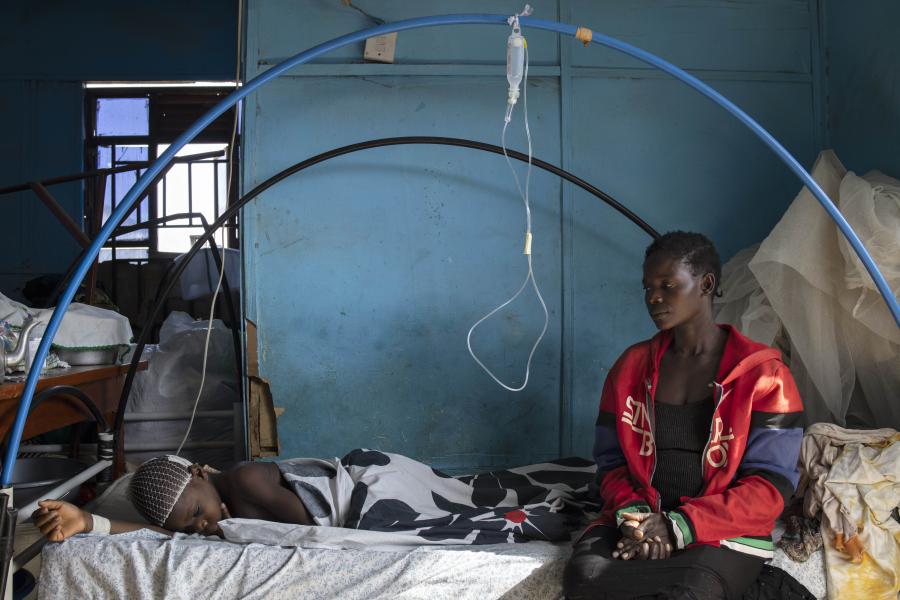2022 Year-end population figures
-
Refugees and asylum-seekers: 1.1 million, 49% women and 51% children
-
IDPs due to conflict: 5.5 million
-
IDP returns: 1.2 million
-
Refugees and asylum-seekers in the DRC: 522,700
2022 situation overview
The humanitarian crisis in the Democratic Republic of the Congo (DRC) – a nation wracked by decades of conflict – remains one of the most complex and protracted situations in the world. The country accounts for over two-thirds of the people UNHCR serves in southern Africa. In 2022, insecurity in the country was exacerbated by a spike in violence in the eastern provinces of Ituri, North Kivu and South Kivu, which displaced hundreds of thousands of people and claimed the lives of many more. UNHCR and other protection actors in the DRC recorded an average of 6,700 protection incidents per month, with a high prevalence of violations of physical integrity and gender-based violence. In addition, due to farming activities being disrupted by relentless conflict and continuous displacement, an estimated 26.4 million people were food insecure across the DRC, making it the most food insecure country in the world.
As of December 2022, 5.5 million people were displaced within the DRC due to conflict, and almost 1.1 million had crossed borders to seek asylum. The DRC also hosted 522,700 refugees and asylum-seekers who had fled from violence in neighbouring countries, mainly Burundi, the Central African Republic, Rwanda and South Sudan. Most refugees from the DRC remained within Africa, with the majority (942,400 people) hosted by Angola, Burundi, the Republic of the Congo, Kenya, Malawi, Rwanda, South Africa, Uganda, the United Republic of Tanzania, and Zambia. In 2022, around 98,000 new arrivals reached Uganda alone.
As part of a coordinated approach to respond to the needs of IDPs in the DRC, UNHCR plays a leadership role in the Protection, Camp Coordination and Camp Management, and Emergency Shelter clusters. Through collaboration with humanitarian and development organizations in 2022, UNHCR reached 105,200 IDPs with emergency shelter support, 16,500 IDP families with cash assistance for rental accommodation, and 54% of gender-based violence survivors with psychosocial counseling in often challenging conditions.
To respond to the needs of refugees from the DRC, the humanitarian community worked within the 2022 DRC Regional Refugee Response Plan (RRP). In the spirit of the Global Compact on Refugees and in accordance with the Refugee Coordination Model, host Governments steered the provision of protection, assistance, and durable solutions to refugees, while 71 RRP partners, led by UNHCR, supported and complemented national and regional strategies, working closely with development actors, the private sector, and refugee-led organizations, among other stakeholders.
In many host countries, refugee settlements and camps reached or exceeded capacity, and the available basic services were either stretched to their limits or too costly to deliver, affecting refugees and local communities alike. Food insecurity was a growing concern, as people struggled to afford necessities due to rising prices caused by high fuel and fertilizer costs, climate shocks, lingering economic issues from the COVID-19 pandemic, and the impact of the conflict in Ukraine on production and supply. The situation was aggravated by food ration reductions and other essential services cuts in camps and settlements due to funding shortages, which led many refugees to resort to negative coping strategies and increased their vulnerability to exploitation and abuse.
Under the RRP, in Angola, Burundi, the Republic of the Congo, Rwanda, Uganda, the United Republic of Tanzania and Zambia, 84,600 refugees from the DRC with specific needs, including persons with disabilities, received material non-cash support. 1.1 million refugees from the DRC and host community members accessed basic health services, including prevention and treatment of communicable and non-communicable diseases, curative care, and maternity and reproductive health services. 32,700 refugee children from the DRC were enrolled in early childhood education, 142,800 in primary school, and 34,000 in secondary school.
Alongside protection and humanitarian assistance, another essential component of UNHCR’s response was the promotion of sustainable livelihoods and the inclusion of refugees in national development plans, including through strengthened partnerships with development actors and other international stakeholders.
In 2022, around 11,300 refugees from the DRC, mainly those who had sought asylum in Zambia, voluntarily repatriated to Kinshasa and the southern provinces of Haut-Katanga and Kasai, compared to 700 in 2021. A total of 12,600 Congolese refugees departed from sub-Saharan Africa, mainly Burundi, Malawi, Rwanda, Uganda, the United Republic of Tanzania and Zambia, for resettlement in a third country, primarily the United States of America, Canada, Norway and Sweden. This was more than a 50% increase from 8,000 departures in 2021. In November 2022, a revised UNHCR position on returns to the DRC was issued, serving to guide the granting of refugee status to new asylum-seekers from the eastern DRC provinces of Ituri, North Kivu and South Kivu.
The humanitarian response to the DRC situation was severely underfunded. The $605 million required by the 2022 DRC Regional RRP was only 35% funded, and UNHCR’s $364.6 million financial ask for the DRC response, including activities within the DRC and in countries hosting refugees from the DRC, was only 47% funded. This funding shortfall deeply affected the response: as of September 2022, only 50% of IDP survivors of gender-based violence in the DRC had received psychosocial care; four out of every five IDPs in the DRC had not received adequate shelter support and were forced to find temporary shelter, or resorted to returning to their homes despite the risks; and 84% of refugee children in the provinces of Ituri and Haut-Uele were at risk of dropping out of school.
